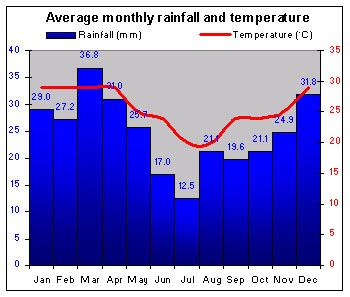COUNTRY INFORMATION |
Introduction |
Fiji is a volcanic archipelago in the southern Pacific Ocean, comprising two main islands and nearly 900 smaller islands and islets. The Melanesian Fijian population was outnumbered in the post-1945 period by ethnic Indians, descended from workers brought over by the British in 1879–1916. A series of coups led by Fijian supremacists between 1987 and 2000 led to a mass exodus of Indo-Fijians, changing the ethnic balance and seriously damaging the economy. |
|
Climate |
 |
The eastern sides of the main islands are wettest, having more than twice the annual rainfall of the western flanks. Fiji lies in a cyclone path. |
|
People |
| Languages |
Fijian, English, Hindi, Urdu, Tamil, Telugu |
|
| URBAN/RURAL POPULATION DIVIDE |
|
|
|
A delicate ethnic balance was shattered by the exodus of Indo-Fijians in 1987–1989 and again in 2000–2001. The lawlessness accompanying the recent upheavals exaggerated ethnic tensions and brought racist rhetoric back to the political mainstream. A substantial population of Polynesians live on Rotuma and have traditionally pressed for autonomy. Women are lobbying for more rights. |
|
Economy |
| GNP (US$) |
1480
|
M |
GNP World rank |
145
|
|
| Inflation |
1 |
% |
Unemployment |
5 |
% |
|
StrengthsRelatively well-diversified economy, with strong tourist infrastructure. Location on Pacific air routes. Many regional and international organizations located in Suva. Weaknesses2000 coup caused dramatic contraction in economy – 12.5%. Migration of many Indo-Fijian professionals. Sugar crops vulnerable to drought. Major exports – sugar, copra, and gold – subject to large fluctuations in world prices. |
|
Politics |
| Lower house |
Last election |
2001 |
Next election |
2006 |
| Upper house |
Last election |
2001 |
Next election |
2006 |
|
The issue of political representation for Fiji's large Indian population has dominated politics since the 1980s. The 1987 coup, justified as defending ethnic Fijian land rights, was condemned internationally. The traditional Great Council of Chiefs emerged as the power broker after the May 2000 coup, despite its lack of constitutional power. It ensured that the Indian-dominated FLP government, elected in 1999, was barred from returning to power and that the multiethnic 1997 constitution remained buried. |
|
Resources |
|
|
| Oil reserves (barrels) |
No data |
Oil production (barrels/day) |
Not an oil producer |
|
The varied terrain allows diversified agriculture. Gold and minerals are mined. A hydroelectric plant at Monasavu provides 95% of electricity. |
|
Health |
| Life expectancy |
69 |
Life expect. World rank |
98 |
| Population per doctor |
1922 |
Infant mortality (per 1000 births) |
14 |
|
|
|
| Principal causes of death |
Cerebrovascular and heart diseases, cancers, accidents |
|
Medical treatment is provided for all at a nominal charge. Fiji is free of almost all tropical diseases. Suicide is rising, particularly among ethnic Indians. |
|
Education |
| Literacy |
93 |
% |
Expend. % GNP |
5 |
%
|
|
| PERCENTAGE OF POPULATION IN FULL TIME EDUCATION |
|
| Primary |
100 |
% |
Secondary |
76 |
% |
Tertiary |
12 |
% |
|
Education, originally modeled on the British system, is now mostly run by local committees and is increasingly racially segregated. The use of the birch in schools was banned in 2002. |
|
Wealth |
| Cars |
59 |
per 1,000 population |
| Telephones |
106 |
per 1,000 population |
| Televisions |
27 |
per 1,000 population |
|
Ostentatious displays of wealth are rare in Fiji; prestige derives from family and landholdings. The professional middle class, traditionally dominated by Indo-Fijians, is becoming more mixed.
|
History |
The British decision to import Indian sugar workers in 1879–1916 dramatically changed Fijian society. - 1970 Independence from Britain.
- 1987 Election win for Indo-Fijian coalition. Sitiveni Rabuka's coups secure minority ethnic Fijian rule. Ejected from Commonwealth.
- 1989 Mass Indo-Fijian emigration.
- 1990 Constitution discriminating against Indo-Fijians introduced.
- 1992 Rabuka wins legislative polls.
- 1997 Census shows ethnic Fijians outnumber Indo-Fijians. Fiji rejoins Commonwealth. New constitution.
- 1999 General election won by FLP. First Indo-Fijian prime minister.
- 2000 Civilian-led coup; new ethnic Fijian government.
- 2001 Nationalists win elections.
|
|